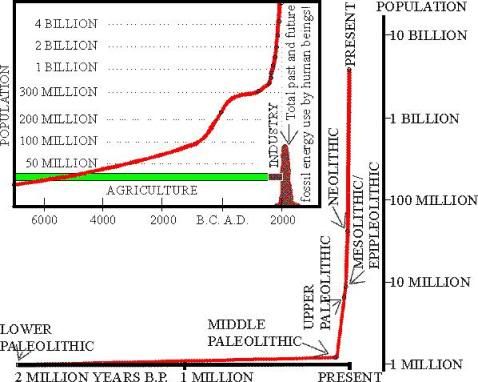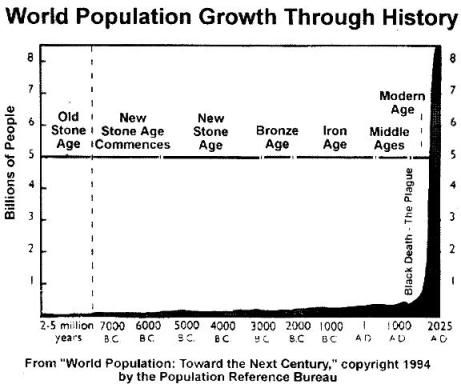@dadpad,
dadpad wrote:
Quote:If you want to know the heart of the problems facing the world today, follow the energy.
As resources become less available labour becomes more sought after.
This is a fair point, up to a point. If we lived on a planet with infinite resources, then we could easily enough go back to a labour intensive economy. However, if we lived on a planet with infinite resources, we wouldn't have to.
What I am trying to get at is that our global human population has exploded on the back of the one time draw down of the stored solar energy of millenia. We now have so many people in the world that we simply cannot function without cheap, easily accessaible and plentiful hydrocarbons. Hell, it's worse than that. I's not just that our global industrial civilisation will collapse without them, it's that we won't be able to feed more than a fraction of our current population without them.
Of course, when about 80% of the current human race has gone into the night, labour will indeed be sought after. I want to take a little time here to explain the severity of the problems facing us, so please bear with me and read on:
As soon as somebody figured out how to use at the industrial level to run an internal combustion engine, this provided the foundation for other technologies to be built on top. This process carried on unabated for a 150 years or so. However, for the last decade or three, easily-accessible energy availability has begun to plateau. This has resulted in world energy prices reaching a point where they became ever more economically unsustainable to use in the profligate way we did for the first 150 years of industrial growth. This, in turn, has led to a pressure in the West to develop technologies that use the energy ever more efficiently. This includes robotisation most obviously. In the developing world, of course, employers are still able to screw labour into working for effectively slave wages and, to a significant extent, our continued easy way of life here in the west has been maintained over the last few decades on the back of that near-slave labour.
However, we are now rapidly approaching an economic singularity where even those technological efficiencies cannot bridge the growing economic dissonance between the way of life we are accustomed to and our capacity to provide it. Indeed, the growth of unsustainable debt over the last couple of decades might be seen as a further development that has happened when technological efficiencies were no longer able to keep up with the disparity and so the debt has been used to paper over the cracks.
One might be tempted to optimistically assume, from the above, that as technology-fixes become ever more expensive to implement due to rising resource prices, there may come a time where a tipping point is reached whereby labour intensive production is once more economically viable. However, the above will only work in an environment where growth is still possible. In other words, if hydrocarbons suddenly became unavailable in a world that, nevertheless, has abundant resources, then a largely labour based economy would be sustainable. The trouble is, there aren't abundant resources. Not for 6.7 billion and rising. Our population has simply exploded on the back of cheaply available hydrocarbon energy and so is completely unsustainable without it.
Take a look at the population growth charts dadpad.
Take a long, hard look at them.
And bear in mind they are not even to scale.

